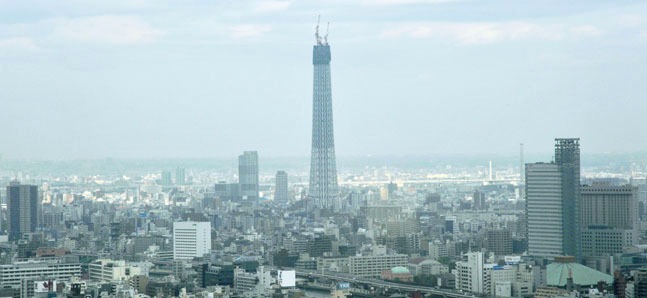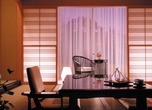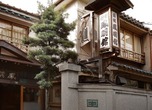
Posted: Tue Jun 01 2010
Despite still being under construction, the new Tokyo Sky Tree has already outgrown its surroundings to become the tallest structure in Japan. Golden Week saw the area so swarming with people wanting to snap the architectural behemoth that, in some places, queues formed and the two local stations – Oshiage Station and Narihirabashi Station– had to employ extra staff for crowd control. Looking up at this giant 350 metre tall structure from the ground is, of course, breathtaking. However, for those with the time and cash enough to splash out have another option: indulging themselves with the view of Tokyo Sky Tree from the Mandarin Oriental Tokyo hotel, located in Nihonbashi.
Occupying the thirtieth to thirty-eighth floors of the Mitsui Tower Building, a building that is itself almost 200 metres tall, the hotel provides an ideal platform from which to look out over both the Kanto Plain and, with approximately half its rooms looking out to the east, the entire Tokyo Sky Tree structure.
To add to the possibilities, from September 2010 until December 2011, the hotel is offering a special plan called ‘MO Making of 634’, whereby guests can book a room from which to observe the growth of this very special ‘tree’ each month. Normally, one night in one of the hotel’s Deluxe Rooms will set you back ¥70,000 (not including Consumption Tax, Service Charge and Tokyo Accommodation Tax); however, by taking advantage of this special plan, guests are offered the chance to stay in one of these rooms once a month for sixteen months at the special price of ¥634,000 (not including Consumption Tax, Service Charge and Tokyo Accommodation Tax), which breaks down to a relative bargain ¥39,625 per night. Plus, because you can reserve the same room throughout the 16 months, not only does the plan offer a chance to observe tower’s construction through to its final completion in 2012, it also offers a chance to observe this progress from exactly the same spot.
Additionally, the hotel also regularly offers plans that allow some extraordinary glimpses into Japanese culture, such as kaidan (ghost stories) told by Teisui Ichiryusai (a professional storyteller and Living National Treasure of Japan), and spring performances by geisha from Yoshicho, one of Tokyo’s most famous geisha districts. Events like these, which aim to provide guests with unique services and opportunities that depend on where in the world they choose to stay, are all part of the Mandarin Oriental Hotel Group’s philosophy of providing guests with a ‘sense of place’. Other site-specific experiences include rice planting in Chiang Mai and afternoon tea overlooking Hyde Park in London. To find out more about the hotel and this unique philosophy, Time Out Tokyo spoke t o the group’s corporate public relations manager, Sally de Souza, who recently flew in from Hong Kong:
Could you tell us a little more about the ‘sense of place’ philosophy?
SD: Over the last ten years the Mandarin Oriental Hotel Group has experienced exceptional growth. This year alone, we’ve already opened Mandarin Oriental Jnan Rahma, Marrakech, which is situated just fifteen minutes from Menara International Airport; later in the year, we’ll be opening our second hotel in Macau, Mandarin Oriental Macau. Plus, within the next three years, we plan to double the size of our current operations by opening hotels in Guangzhou, Taipei, Abu Dhabi, Costa Rica, Milan and Paris. However, we think of ourselves as more than just a ‘hotel chain’. Each of our hotels aims to both respect the local culture and provide guests with an experience that is unique to that particular region, thereby creating a distinctive ‘sense of place’ that can’t be experienced at any other international luxury hotel.
With Tokyo being the huge city that it is, why did you choose to develop the hotel in Nihonbashi?
SD: In setting up a new city based hotel, it’s imperative to choose the right location. Nihonbashi is an area in which both the old and the new exist side by side; plus, the area also has a particularly luxurious feel. Exemplifying these qualities is the Mitsui Tower Building, which stands directly adjacent to the historic Mitsui Main Building and provides an ideal location for the hotel.
Our ultimate objective is to create a ‘legendary hotel’. We aim to provide a level of service that our guests will refer to as ‘legendary’ and to become a long-standing hotel that the local residents feel proud to have in their neighbourhood. At the moment, Mandarin Oriental Tokyo has only five years of history; however, as time passes, we’d like to build a reputation that will one day allow us to earn a place amongst Nihonbashi’s many long-standing and well-respected establishments.
Having travelled to Tokyo on more than a few occasions, is there a particular part of the city that you especially like?
SD: When I come it’s almost always on business, so more often than not I end up being stuck in the hotel. However, for a city with a population of 13 million, I’m always surprised at how quiet it is. Also, I find the mix of new technology and traditional old customs here fascinating. The way that, even now, people still occasionally wear traditional clothing, such as kimono and yukata, is something that you don’t see very often in other countries nowadays. I think the way people here have a deep respect for their history yet still live a very modern and contemporary life is something unique to the Japanese people.
By staying at the Mandarin Oriental Tokyo, we hope that our many guests can experience some of the various aspects of Edo culture that the people here still naturally incorporate as part of their everyday lives.
Lastly, is there anything that you always take with you when you travel?
SD: I take a book. I received a Kindle for Christmas and it’s become a real boon. I also take my Filofax – with my entire schedule inside, it’s something I simply couldn’t do without.
Mandarin Oriental Tokyo (Full detail & map)
‘MO Making of 634’ Inquiry and Reservation: (0120)806 8250/(03)3270 8950
Tweets
- About Us |
- Work for Time Out |
- Send us info |
- Advertising |
- Mobile edition |
- Terms & Conditions |
- Privacy policy |
- Contact Us
Copyright © 2014 Time Out Tokyo














Add your comment